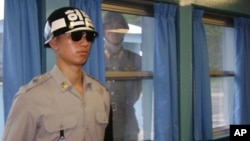China is urging restraint after North Korea announced it would nullify the Korean War armistice with South Korea if Seoul goes ahead with plans to conduct annual war exercises with the United States.
"The Korean War armistice is significant in terms of maintaining peace and stability on the Korean Peninsula," Chinese Foreign Ministry spokeswoman Hua Chunying said at a daily press briefing Wednesday.
Hua said China hoped that all parties would refrain from actions that could further escalate tensions.
"In the long-term, we believe that a peace mechanism should replace the armistice," Hua said. She added that negotiations among relevant parties should be the means to achieving the goal of peace and stability in the region.
Pyongyang has issued similar threats before, also timed to coincide with the annual joint U.S.-South Korean naval exercises.
On March 5, U.N. diplomats said the United States and China reached a tentative deal on new sanctions to punish North Korea for its latest nuclear weapons test. After the February test, China’s official stance was to “resolutely” oppose North Korean testing.
North Korea is already under tough sanctions as a result of its previous nuclear tests in 2006 and 2009. In January, the U.N. Security Council expanded those sanctions in response to a December rocket launch.
China is North Korea's top ally and trading partner and supplies the impoverished country with crucial economic and humanitarian assistance. China also is seen as one of the few nations able to influence Pyongyang.
"The Korean War armistice is significant in terms of maintaining peace and stability on the Korean Peninsula," Chinese Foreign Ministry spokeswoman Hua Chunying said at a daily press briefing Wednesday.
Hua said China hoped that all parties would refrain from actions that could further escalate tensions.
"In the long-term, we believe that a peace mechanism should replace the armistice," Hua said. She added that negotiations among relevant parties should be the means to achieving the goal of peace and stability in the region.
Pyongyang has issued similar threats before, also timed to coincide with the annual joint U.S.-South Korean naval exercises.
On March 5, U.N. diplomats said the United States and China reached a tentative deal on new sanctions to punish North Korea for its latest nuclear weapons test. After the February test, China’s official stance was to “resolutely” oppose North Korean testing.
North Korea is already under tough sanctions as a result of its previous nuclear tests in 2006 and 2009. In January, the U.N. Security Council expanded those sanctions in response to a December rocket launch.
China is North Korea's top ally and trading partner and supplies the impoverished country with crucial economic and humanitarian assistance. China also is seen as one of the few nations able to influence Pyongyang.





